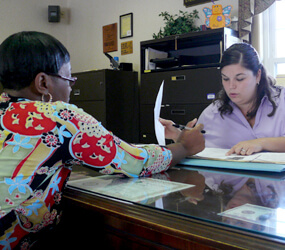BELLEVILLE, Ill. – Car payments, school fees, new tires, insurance payments, even funeral costs: Sometimes the money to keep a person from slipping over the edge just isn’t available.
The Society of St. Vincent de Paul has begun a program to give small loans to help people step away from the brink of financial disaster.
With $15,000 from the society’s conferences at Blessed Sacrament Parish in Belleville and St. Clare and St. Nicholas parishes in O’Fallon, and an additional $5,000 donation, the society teamed up with the Catholic & Community Credit Union to make loans of up to $300 to people who are employed but are facing some extraordinary expense that would push them into a cycle of debt they can’t manage.
“We’re really helping people,” Pat Hogrebe, St. Vincent de Paul development director, told The Messenger, newspaper of the Belleville Diocese.
Hogrebe, along with a small committee, reviews applications for loans, completes paperwork and sends it on to the credit union for processing.
Regina Austin recently picked up a check for a car payment. Her car engine died; one daughter became pregnant and moved home; and another daughter was deployed to Afghanistan, leaving Regina with her car payment.
“This is a good deal,” Austin said of the loan.
Austin considered getting a “payday loan” so that she could meet her car payment, but she didn’t want to get caught up in the high-interest payments and the spiraling debt generated by loans with an annual interest rate of 200 percent or more.
The credit union interest rate is 4 percent over the life of the loan, which is set up in payments the borrower can afford.
A payday loan, also called a title loan if a car title is used as collateral, is generally a short-term loan that is intended to cover a borrower’s expenses until his or her next payday. However, the interest amounts on these short-term loans are generally extremely high.
Malachi Duncan said staying away from a payday loan and qualifying for the St. Vincent de Paul loan made it possible for him to continue college. Outstanding bills from last semester would have prevented him from receiving a Pell grant for school.
Now, he said, he can continue his education, and hopes one day to be a social worker and help at-risk youths.
Marilyn Nnamdi didn’t know what she would do when she needed tires and her fixed income didn’t leave enough money to buy them.
“I was just going to drive on the tires until the Lord made a way for me,” she said. “And he did.”
Many of the loans from the society will help people escape from the payday-loan companies.
Hogrebe and others compared them to loan sharks. “It’s predatory lending,” she said. “People get into a situation where they feel they have no choice” but to go to the payday-loan operations.
“They (payday loans) will ruin your life,” Austin said.
To qualify for one of the society’s loans, Hogrebe said, the applicant must open a $25 savings account at the credit union and agree to attend a class on managing finances. Then volunteer mentors meet with people individually to help them work on their budgets.
The goal is to help the working poor over some unforeseen difficulty.
In the past, the society has advocated against the predatory lending practices of payday loans, but this new program takes the next step by offering people an alternative to those loans.
The credit union assumes no risk, but it does handle the paper work and the repayment of the loans.
“We are happy to partner with the St. Vincent de Paul organization to help them serve their clients’ needs,” said Ken Bossung, credit union president.
“We believe that this program can help by not only meeting an immediate need with the loan but also by giving people an opportunity to improve their credit and get a savings account,” he said.
The society uses the services of the University of Illinois Extension for the finance classes, Hogrebe said.
It is most important that these folks repay the loans, Hogrebe said, so that others can then borrow the money.
“It’s sometimes tough to reach these people,” she said. “These are people living on the edge, and what’s really scary is that more and more people are on that edge.”
However, Hogrebe smiled and said, “These loans are helping people keep from sinking.”


